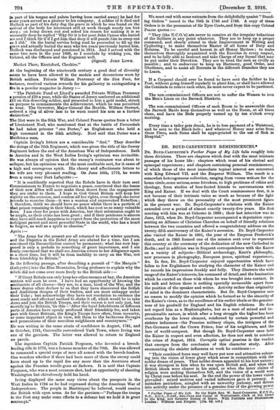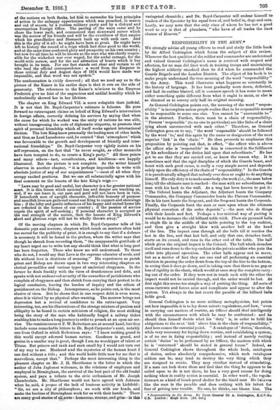DR. BOYD-CARPENTER'S REMINISCENCES.*
Da. Born-CARPENTER'S Further Payee of My Life falls roughly into three divisions. There are chapters which deal with the most intimate passages of his home life ; chapters which treat of his clerical and episcopal experiences ; and chapters containing personal reminiscences, of which those of the most immediate topical interest are concerned with King Edward VII. and the Emperor William. The result is a somewhat heterogeneous collection, ranging from verses written for the home circle, some serious, some frivolous, to high problems of ethics and theology, from studies of four-footed friends to conversations with King and Kaiser. If we deal with the Court reminiscences first, it is not because of their intrinsio value so much as because of the light which they throw on the personality of the most prominent figure in the present war. Dr. Boyd-Carpenter's relations with the Kaiser extended over a period of almost exactly twenty-five years. His first meeting with him was at Osborne in 1889 ; their last interview was in June, 1913, when Dr. Boyd-Carpenter accompanied a deputation repre- senting an Alliance of Christian Churches on behalf of friendly relations between the two countries and offered a congratulatory address on the twenty-fifth anniversary of the Kaiser's accession. Dr. Boyd-Carpenter also visited the Kaiser in 1901, the year of the Empress Frederick's death, and in 1905 formed ono of the mission sent over to represent this country at the ceremony of the dedication of the new Cathedral in Berlin ; and in addition was in frequent correspondence with the Kaiser on a variety of subjects—Biblical archaeology, Kant's philosophy, new processes in photography, European peace, spiritual experiences, &e. In fine, Dr. Boyd-Carpenter enjoyed opportunities which have fallen to few Englishmen for studying the character of the Kaiser and he records his impressions frankly and fully. They illustrate the wide range of the Kaiser's interests, his command of detail, and the fascination which he exerted on those with whom ho was brought into contact. In his talk and letters there is nothing specially memorable apart from the position of the speaker and writer. Activity rather than originality of mind is the dominant characteristic. But Dr. Boyd-Carpenter sees no reason to modify the opinion which he formed as to the sincerity of the Kaiser's views, as to the excellence of his earlier ideals or the genuine- ness of his goodwill for England and his English relations. Ho does not regard him as a Mephistopheles, but as a man of mixed and im- pressionable nature, in which after a long struggle the higher has been overborne by the lower element, reinforced by certain powerful and sinister influences—the Prussian military clique, the intrigues of the Pan-Germans and the Crown Prince, fear of his neighbours, and the lure of world-conquest. But though Dr. Boyd-Carpenter once hold the Kaiser in respect and even affection, he does not seek to condone the crime of August, 1914. Corruptio optimi paseima is the verdict that emerges from the conclusion of this character study. After enumerating the sinister influences at work he continues :— " Their combined force may well have put new and attractive colour- ing into the vision of lower glory which arose in competition with the nobler dream of peace. That nobler dream appealed to his best nature ; it was strongest in him when he was upon British soil, and when the British ideals were clearer in his mind, or when the inner claims of religion were making themselves felt, and the vision of a world won by Christ rose before his soul. In the end the power of the lower vision prevailed : mixed motives and varied influences gave it potency.. A mistaken patriotism, mingled with an unworthy jealousy, and driven into activity under the pressure of a genuine fear of the growing power • Further Pages of Ng Life. By the Right Rev. W. Boyd-Carpenter, K.C.V.O., D.D., DXJ,„ D.Litt., Bub-Dean and Canon of Westminster, Clerk of the Closet to the King, and formerly Bishop of Ripon. With redraft./ and Illustrations London: Williams and Norgate. [10s. bd. neta
of the nations on both flanks, led hirir to surrender his best principles of action to the unhappy opportunism which was preached, in season and out of season, by a restless military party and by a disloyal and unscrupulous Foreign Offioe. The parting of the ways came and he chose the lower path, and commenced that downward career which was the sorrow of his friends and will be the overthrow of that empire which his grandfather and Bismarck built up with such care. And -this is the pity of it all : he might have been so great. He might have . left to history the record of a reign which had done good to the world,- and at the same time conferred glory and prosperity on his own country ; but now for all time he will be known as the man who was chiefly respon- sible for the wickedest war ever waged, for the awful carnage, for the world-wide sorrow, and for the sad alienation of hearta which it has brought in its train. For one fact stands out clear and certain to all who read the official correspondence : a word from the Emperor in those critical July and August days of 1914 would have made war impossible, and that word was not spoken."
The condemnation is richly deserved ; all that we need say as to the picture of the Kaiser in his earlier days is that it errs on the side of generosity. The references to the Kaiser's relations to the Empress Frederick give no hint of the ungracious and unfilial hostility which he undoubtedly showed her in her lifetime.
The chapter on King Edward VII. is more eulogistic than judicial. It is not that Dr. Boyd-Carpenter's estimate is fulsome. He puts forward no extravagant claims on behalf of. King Edward's intervention. in foreign affairs, correctly defining his services by saying that when the cause for which he worked was the unity of nations he was able, without tra.nsgrosaing the code of diplomatic etiquette, to promote that spirit of personal friendship which of itself works against international' friction. The late King knew personally the leading men of other lands, and thus, as Lord Lansdowne raid, he created "that 'atmosphere' which was favourable to the growth and development of friendly and inter- national friendships." Dr. Boyd-Carpenter very rightly insists on his self-repression, on the fact that " he never sought, as other monarchs have been tempted to do, to create a King's party." All these points and many others—tact, consideration, and kindliness—are happily illustrated. But the picture is not complete. As the writer himself observes in another chapter, " it is perhaps impossible to write with absolute justice of any of our acquaintances "—most of all when they occupy exalted positions. But we can all substantially agree with his final comment on the lessons of the late King's reign Laws may be good and useful, but character is a far greater national asset. It is this lesson which national loss and danger are teaching us, and, if we can learn it, our pain and peril will not have been in vain. If henceforth mon of upright character, inflexible honesty of purpose and unselfish lives are gathered round our King to support and encourage him ; if the lofty and gentle influences of his happy and united home life are reflected in the homes of our country ; if the passion of service expels the spirit of self-seeking ; if personal character is accepted as the real strength of the nation, then the lessons of King Edward's abort and glorious reign will not be wholly thrown away."
Of the moving chapters in which Dr. Boyd-Carpenter tent] of his domestic joys and sorrows, chapters which touch on matters often held too sacred for the publicity of print, it is enough to say that if a defence is necessary it will be found in the preface, where the writer says that though he shrank from recording them, " the unappeasable gratitude of my heart urged me to write lest any should think that what is long past has been forgotten. Those who know me will understand. To those who do not, I would say that Love is the supreme educator of souls, and life without love is destitute of meaning." His experiences as parish priest and Bishop are drawn upon in two very interesting chapters on clerical peccadillos and various types of unclorical clergymen. In the former he deals frankly with the vices of drunkenness and debt, and speaks with not undeserved severity of the cowardice of parishioners who complain of clergymen and then shrink from carrying their protest to its logical conclusion, leaving the burden of inquiry and the odium of punishment on the Bishop. Intemperance, as he points out, is the moat elusive of vices. . But he shows that in one respect debt is even worse, since it is visited by no physical after-warning. . The morrow brings not depression but a revival of confidence to the extravagant. Very interesting, too, are his illustrations of the strange mixture of pietism and obliquity to be found in certain ministers of religion, the most striking being the story of the man who habitually forged a railway ticket enabling him to make a long journey in order to preach at an open-air ser- vice. The reminiscences of F. W. Robertson are at second hand, but they include some remarkable letters to Dr. Boyd-Carpenter's aunt, notably one from Oxford in which Robertson says : " I know nothing grand in this world except adcrned human nature. Goodness is grand, and genius in a smaller way is great, though I am no worshipper of talent or Titans. But princes and rank and such small fry I would not turn out of my way to see. Manhood and the mysteries of the human heart I can find without a title ; and this world holds little now for me that is marvellous, except that." Perhaps the most interesting thing in the pleasant chapter on Mr. J. H. Shorthouse is the letter in which the author of John Inglesant welcomes, in the relations of employers and . employed in Birmingham, the survival of the best part of the old feudal system, and pays a tribute to the civic enthusiasm of Mr. Joseph Chamberlain. Mr. Shorthouse would not have agreed with Johnson when he said, d propos of the lack of business activity in Lichfield : " Sir, we are a city of philosophers ; we work with our heads, and make the boobies of Birmingham work for us with their hands." There are many good stories of all sorts—humorous, stranee, and grim—in this
variegated chronicle ; and Dr. Boyd-Carpenter will endear himself to readers of the Spectator by his equal love of, and belief in, dogs and cats. Lastly, wo may note that the only class of whom be has not a good word to say is that of plumbers, •" who have of all trades the least chance of Heaven."













































 Previous page
Previous page